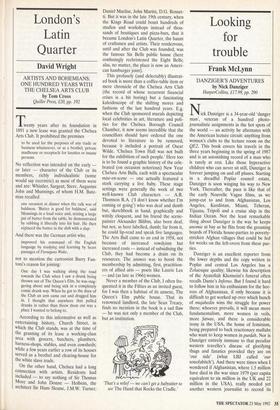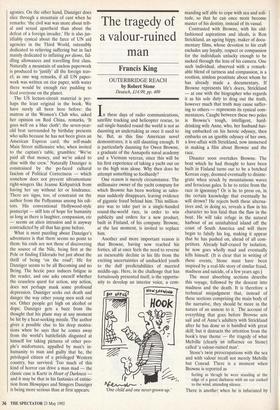Looking for trouble
Frank McLynn
DANZIGER'S ADVENTURES by Nick Danziger HarperCollins, £17.99, pp. 290 Nick Danziger is a 34-year-old 'danger man', veteran of a hundred photo- journalistic assignments in the hot spots of the world — an activity he alternates with the American lecture circuit: anything from women's clubs to the lecture room on the QE2. This book covers his travels in the three years beginning in the spring of 1987 and is an astonishing record of a man who is rarely at rest. Like those hyperactive children who can never sit still, Danziger is forever jumping on and off planes. Starting in a dreadful Poplar council estate, Danziger is soon winging his way to New York. Thereafter, the pace is like that of the early Nouvelle Vague films, as we jump-cut to and from Afghanistan, Los Angeles, Kurdistan, Miami, Teheran, Tijuana, Tripoli and a cruise ship in the Indian Ocean. Not the least remarkable thing about Danziger is the way he keeps anomie at bay as he flits from the groaning boards of Florida house-parties to poverty- stricken Afghan villages that could be fed for weeks on the left-overs from these par- ties.
Danziger is an excellent reporter from the lower depths and the copy written in Poplar and central Los Angeles has a Zolaesque quality; likewise his description of the Ayatollah Khomeini's funeral often recalls Dante's Inferno. But I found it hard to follow him in his enthusiasm for the hor- rors of Afghanistan, if only because it is difficult to get worked up over which bunch of mujahedin wins the struggle for power there; whoever prevails, it will mean more fundamentalism, more women in veils, more fatwas, and there is considerable irony in the USA, the home of feminism, being prepared to back reactionary mullahs who want to keep women in purdah. Nor is Danziger entirely immune to that peculiar western traveller's disease of glorifying thugs and fanatics provided they are on `our side' (what LBJ called 'our sonofabitch'). And there were times when I wondered if Afghanistan, where 1.5 million have died in the war since 1979 (per capita equivalent to six million in the UK and 22 million in the USA), really needed yet another western journalist to record its
agonies. On the other hand, Danziger does slice through a mountain of cant when he remarks: 'the civil war was more about trib- al and sexual apartheid than about the defeat of a foreign invader.' He is also jus- tifiably cynical about the farce of UN aid agencies in the Third World, ostensibly dedicated to relieving suffering but in fact
mainly dedicated to inflating per diems, fid- dling allowances and travelling first class. Naturally a mountain of useless paperwork is produced to 'justify' all the foreign trav- el; as one wag remarks, if all UN paper- work was written on rice paper, with water there would be enough rice pudding to feed everyone on the planet.
The US lecture-circuit material is per- haps the least original in the book. We have surely all been here before: the matron at the Women's Club who, asked her opinion on Red China, remarks, `It goes well on a blue cloth'; the seven-year- old brat surrounded by birthday presents who sulks because he has not been given an American Express card; the self-made Main Street millionaire who, when invited to the captain's table, grumbles: 'We've paid all that money, and we're asked to dine with the crew.' Naturally Danziger is constrained by the po-faced cultural fascism of Political Correctness — which somehow does not prevent ultramontane right-wingers like Jeanne Kirkpatrick from having her say without let or hindrance. There are signs, too, of constraint on the author from the Pollyannas among his edi- tors. His conventional Hollywood-style postscript — still lots of hope for humanity as long as there is laughter, compassion, etc — seems an alien intrusion and is anyway contradicted by all that has gone before.
What is most puzzling about Danziger's adventures is that there seems no point to them: his ends are not those of discovering the source of the Nile, being first at the Pole or finding Eldorado but just about the thrill of being 'on the road'; life for Danziger seems to be all Becoming and no Being. The hectic pace induces fatigue in the reader, and one asks oneself whether the ceaseless quest for action, any action, does not perhaps mask some profound depression. Danziger seeks out death and danger the way other young men seek out sex. Other people get high on alcohol or dope; Danziger gets a buzz from the thought that his plane may at any moment be hit by a heat-seeking missile. The author gives a possible clue to his deep motiva- tions when he says that he comes away from the world's battlefields disgusted at himself for taking pictures of other peo- ple's misfortunes, appalled by man's in- humanity to man and guilty that he, the privileged citizen of a privileged Western country, has surviyed. Too much of this kind of horror can drive a man mad — the classic case is Kurtz in Heart of Darkness and it may be that in his fantasies of extinc- tion from Blowpipes and Stingers Danziger is being more serious than at first appears.



































































 Previous page
Previous page